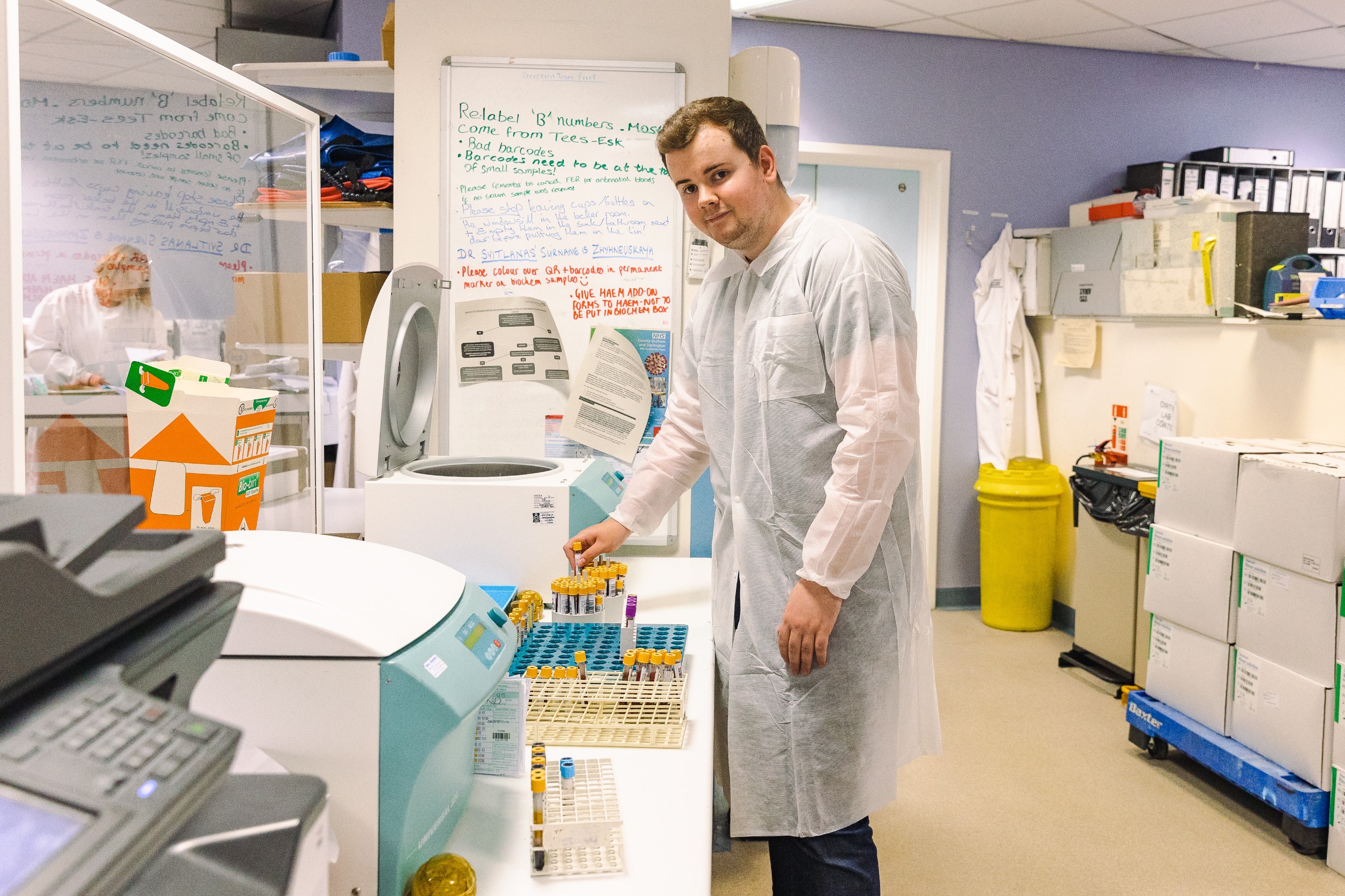
Clinical Biochemistry
The Haematology and Blood Transfusion laboratories at Darlington Memorial Hospital and University Hospital of North Durham operate a 24/7 service covering both acute CDDFT sites and GP surgeries across Darlington, North Durham and Durham Dales.
The CDDFT Haematology laboratories are located at DMH and UHND. Each laboratory holds UKAS accreditation for ISO 15189:2012 (UKAS accredited testing laboratory No. 8770). The laboratories provide a range of primary Haematological investigations via automated and manual methods. Below is a list of all investigations provided by each site (unless stated otherwise):
| Full Blood Count | Reticulocyte Count | Blood Films | Erythrocyte Sedimentation Rate (ESR) |
| Coagulation Screening (PT, APTT, Fibrinogen) | DDimer | Malarial Parasites | Glandular Fever Screening |
| Sickle Cell Solubility (UHND only) | Thrombophilia Screening (UHND only) | Lupus Anticoagulant (UHND only) | Anti-Xa Assay |
| G6PD screening (UHND only) | Haemoglobinopathy Screening (UHND only) | Anticardiolipin antibodies (UHND only) | Intrinsic Factor Antibodies (UHND only) |
The CDDFT Blood Transfusion Laboratories, located at UHND and DMH, provide a blood transfusion service to all of the Trusts main hospitals, community hospitals, hospices and GPs. The Transfusion Department is both MHRA compliant and has been inspected by UKAS (accredited to ISO 15189). The transfusion laboratory participates in all relevant external quality assurance schemes.
The Blood Transfusion Department test repertoire includes blood group and antibody screening (with associated antibody identification), compatibility testing (serological and electronic issue), phenotyping, antenatal serology, kleihauer testing and Direct Antiglobulin Test. The Blood Transfusion Laboratories provide the following services:
Routinely available on any patient if clinically indicated. For non-medical reasons e.g. travel, sport, insurance or employment, please contact the laboratory for arrangement under Category II Regulations.
A full antenatal serology service is available.
Ideally 24 hours notice should be given for a non-urgent cross-match. This is to allow sufficient time to investigate any abnormality detected in the antibody screen or cross-match. If 24 hours notice is not given, it may not be possible to have blood available at the requested time if an abnormality is detected in the course of the investigations. This may result in the last minute cancellation of an elective operation/procedure.
The laboratory must be informed by telephone. In an emergency, crossmatched blood can normally be provided within one hour of receipt of the sample. Uncrossmatched Group O can be emergency issued to your patient within 5 minutes of requesting on our acute sites (DMH & UHND). In exceptional circumstances, un-crossmatched O Negative (Flying Squad) blood may be used. This can be taken directly from the Blood Bank fridges located at DMH, UHND & BAH. If the Flying Squad blood is used, the laboratory must be informed immediately so that the blood can be replaced and a retrospective cross-match performed. The trust operates a Major Haemorrhage Protocol which all clinical staff should be aware and familiar with. Please refer to POL/Transfusion/0003 Major Haemorrhage Policy for full details (access via StaffNet ‘Policies and Procedures’ section).
A stock of fresh frozen plasma and cryoprecipitate is kept at UHND and DMH blood banks and is available on request (thawing time 30 minutes). Platelet concentrates are not routinely stored on site and have to be transported from the Blood Transfusion Services in Newcastle on request.
All blood will be de-reserved and removed from the Blood Bank fridge 24 hours after the time it was required. If blood needs to be reserved for a longer period of time, this must specifically be requested.
A stock of albumin, prophylactic Anti-D, Beriplex and Novoseven is kept at UHND and DMH and is available on request. A small stock of prophylactic Anti-D is also kept at BAH. Please refer to appropriate transfusion clinical policy for further details, accessed via StaffNet ‘Policies and Procedures’ section.
Measurement uncertainty (MU) is defined as a parameter, associated with the result of measurement that characterises the dispersion of the values that could reasonably be attributed to the measurand. By quantifying the possible spread of measurements an estimate of the confidence in the result may be obtained.
MU stems from imprecision as a result of random effects on the assay systems and so laboratories have to minimise the effects of this and acknowledge this uncertainty.
Within the examination process the laboratory can calculate the measurement of uncertainty that is associated with a measured analyte. We can use our internal and external quality performance checks to assess the individual uncertainties within the measurement system. For further information on our internal and external quality control systems please contact the laboratory.
The MoU is the quantification of doubt, not error. The co-efficient of variation (CV%) or standard deviation (SD) can be considered as the combined uncertainty for results around the mean of a particular concentration of quality control material.
Working Example
For Haemoglobin, the Measurement Uncertainty in June 2017 (DMH) = 2.29%. Therefore, a Haemoglobin reported as 100g/L would have a Measurement Uncertainty of 97.7g/L - 102.3 g/L
Uncertainty of Measurement:
Uncertainty of Mesurement (UoM) is calculated for all FBC results for each QC lot number. The UoM is also calculated for other Haematology results and Coagulation results. These results are available on request from the Haematology Laboratory. If you require this information please contact Haematology DMH #43252 or Haematology UHND #32442.